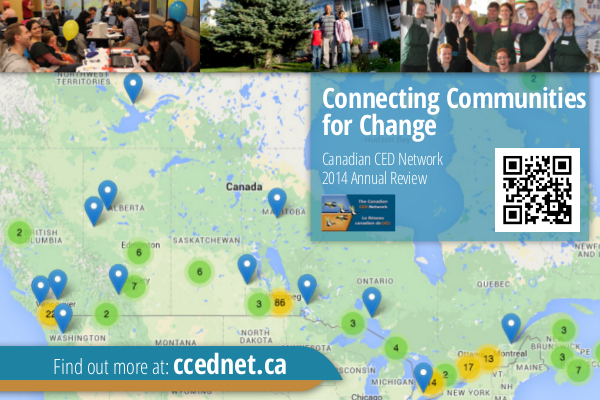 CCEDNet member David Upton was thrilled at the invitation to present on the opportunities social enterprise has to offer Nova Scotia, as a new effort seeks to change the future course of the economically and demographically challenged province.
CCEDNet member David Upton was thrilled at the invitation to present on the opportunities social enterprise has to offer Nova Scotia, as a new effort seeks to change the future course of the economically and demographically challenged province.
Nova Scotia stands at a crossroads, a report on the province released last year identifies. A bright future is not guaranteed and there is a critical need for a collaborative effort to create positive change.
“If Nova Scotia’s economy were performing well today in providing jobs, sustaining communities and supporting high quality public services, the wise advice would be to stay the course and avoid major changes,” the One Nova Scotia (One NS) Report states.
“But this is not our situation, nor does the future outlook promise relief.”
The report identifies some fairly significant economic and demographics issues facing the province. It also lists goals to strive towards to ensure growth and prosperity.
The Nova Scotia Coalition on Building Our New Economy has now been struck by Nova Scotia’s government. The coalition consists of multi-sector, all-party representatives and is intended to generate collective, collaborative action to build a better province. As the One NS report states, “A province-building project is not dependent on government policies or the state of the world economy. It is about us, our courage, our imagination and our determination to do better.”
The coalition has been meeting monthly through 2014 on the various themes of the report, discussing how government, the private and non-profit sectors and others can work together to create the province everyone desires.
The current theme is youth and social entrepreneurship.
A respected and active player in the social enterprise sphere, David presented at the commission’s Nov. 27 meeting, which included the premier and party leaders.
“We’re really encouraged by the willingness (of the commission) to include us in the conversation and now we’re really hopeful that in an expedient way they’re going to respond positively to our reaching out,” David says.
Dr. Gaynor Watson-Creed is a medical officer of health and One NS commissioner. She says she believes the possibilities that social enterprise presents are “huge” for a few reasons.
“The One Nova Scotia Report is first of all a call to action around revitalizing Nova Scotia’s economy and so when we’re talking about that, the social enterprise sector can do a number of things for us,” Gaynor says.
She goes on to note that businesses generate economic productivity, which is an opportunity in and of itself.
“Second, social enterprises are compelling businesses because the product is a social good and so they become an attractant to Nova Scotia for individuals who are looking for that type of opportunity in the workforce.”
Gaynor also notes the draw that social enterprises poses for the province’s young people “who are telling us that they are looking for opportunities to be involved in work that is meaningful and creates good within their communities.”
Finally, as a public health professional, Gaynor sees the opportunity to address complex issues with an “outside-of-the-box” approach through engaging the social enterprise sector.
“The reason I get excited about that is that it creates the opportunity for us to do some fundamentally different things about complex problems that have dogged us for decades in some cases.”
Looking ahead, Gaynor proposes that much of the social enterprise talent in Nova Scotia is hidden. “The critical piece will be to elevate that, showcase it and invite the wisdom that’s there to help us tackle these complex problems that are named in the One NS report,” she says.
“The more we can get Nova Scotians seeing the benefits and the potential of social enterprise, the better the conversations will be, the better the solutions that get generated around them in Nova Scotia.”
David’s report identified six action items that can help advance the social enterprise sector and thereby the province.
“We thought those were all doable requests, places that the government could start to collaborate (within) that, in this severe financial crisis, wouldn’t cause undue stress on the treasury but would in fact help improve the treasury situation as it relates to the social cause,” David says.
The six action items include:
- Program Access: Ensure social enterprises in Nova Scotia can access provincial government programming now available to Small and Medium Enterprises (SMEs).
- Sector Co-creation: Create a collaborative structure for ongoing co-creation of the sector that draws on the Scottish model of sector development.
- Buy Social: Become a Buy Social Canada Purchaser to facilitate pan-departmental purchasing from social enterprise in Nova Scotia.
- Legislation: The Nova Scotia Societies Act as currently written complicates the operations of many social enterprises in Nova Scotia. There is a need to remove the statement, “the Society will not carry on a business, including a non-profit business” and/or to replace it with a more progressive statement that recognizes the social and economic impact of social enterprise activity. There is also a need to finalize the Community Interest Company regulations and ensure they are operational.
- Sector Building: Collaborate on capacity building and convening the social enterprise sector to support its development and expansion to new geographic areas and new industries.
- Social Finance Development:
- Resolve existing gaps in social innovation and impact investment through the creation of tools such as the Social Impact Fund, patient capital, slow money, and Quebec’s Fiducie du Chantier de l’économie sociale model.
- Change the order of security in the provincial loan guarantee program so that government guarantee becomes primary security for non-profit social enterprise and organization assets become second security. There is also a need to expand vendors of this program to better serve rural areas of the province.
This article was originally posted by www.axiomnews.com on December 4, 2014 and appears here with permission.
Michelle Strutzenberger brings more than 10 years of experience in writing, social media, curation and digital distribution. Subject areas of interest include creating abundant or deep communities, social-mission business, education that strengthens kids’ sense of hope and possibility and journalism that helps society create its preferred future. She is currently supporting the development of Axiom News podcasts. Contact Michelle at michelle at axiomnews.com.
 The Plan d’action gouvernemental en économie sociale 2015-2020 [in French only] anticipates a total investment of more than 100 million dollars over five years to support Québec social economy enterprises. The measures that will be implemented will contribute to the creation or maintenance of 30,000 jobs and will generate total investments of over 500 million dollars by 2020.
The Plan d’action gouvernemental en économie sociale 2015-2020 [in French only] anticipates a total investment of more than 100 million dollars over five years to support Québec social economy enterprises. The measures that will be implemented will contribute to the creation or maintenance of 30,000 jobs and will generate total investments of over 500 million dollars by 2020.

 In your view, what are three (or key) elements of “new economies”?
In your view, what are three (or key) elements of “new economies”?
 Justin Ritchie is a research analyst and digital media broadcaster who works on data motivated inquiries into a low carbon energy transition and financial systems at UBC’s
Justin Ritchie is a research analyst and digital media broadcaster who works on data motivated inquiries into a low carbon energy transition and financial systems at UBC’s  After working in the non-profit and social enterprise arena for over three decades, David LePage founded
After working in the non-profit and social enterprise arena for over three decades, David LePage founded  We need to change the structure of the economy and what we value as a society.
We need to change the structure of the economy and what we value as a society. David LePage is a Principal with Accelerating Social Impact CCC, Ltd. (ASI), one of Canada’s first ever hybrid corporations. ASI CCC was created to serve and promote the emerging blended value business and social finance sectors. David works as a consultant, trainer and advisor with a cross section of social enterprises, social purpose businesses and social impact investors. He is a founder of Buy Social Canada, an initiative to promote social purchasing and social enterprise certification.
David LePage is a Principal with Accelerating Social Impact CCC, Ltd. (ASI), one of Canada’s first ever hybrid corporations. ASI CCC was created to serve and promote the emerging blended value business and social finance sectors. David works as a consultant, trainer and advisor with a cross section of social enterprises, social purpose businesses and social impact investors. He is a founder of Buy Social Canada, an initiative to promote social purchasing and social enterprise certification. In your view, what are three key elements of “new economies”?
In your view, what are three key elements of “new economies”?


 Every year, CCEDNet members are
Every year, CCEDNet members are 



 Last week, CCEDNet members gathered online to participate in the annual general meeting (AGM).
Last week, CCEDNet members gathered online to participate in the annual general meeting (AGM). CCEDNet’s Executive Director, Mike Toye, presented highlights of the last year from our virtual annual report. The theme of this year’s report is ‘Connecting Communities for Change’, emphasizing the role CCEDNet plays as a network to connect and support community leaders in their efforts to improve lives.
CCEDNet’s Executive Director, Mike Toye, presented highlights of the last year from our virtual annual report. The theme of this year’s report is ‘Connecting Communities for Change’, emphasizing the role CCEDNet plays as a network to connect and support community leaders in their efforts to improve lives. 

 In 2017, Canadians across the country will celebrate Canada’s 150th Anniversary of Confederation (Canada 150), a key milestone in the life of our country. The overarching theme to celebrating Canada 150 is “Strong. Proud. Free”, which includes a vision to Give Back to Canada, through lasting legacies that extend beyond 2017.
In 2017, Canadians across the country will celebrate Canada’s 150th Anniversary of Confederation (Canada 150), a key milestone in the life of our country. The overarching theme to celebrating Canada 150 is “Strong. Proud. Free”, which includes a vision to Give Back to Canada, through lasting legacies that extend beyond 2017. Southern Ontario
Southern Ontario Localizing prosperity is about building upon existing strengths so that communities can develop from within, maximizing the local economic and social benefits for everyone.
Localizing prosperity is about building upon existing strengths so that communities can develop from within, maximizing the local economic and social benefits for everyone.

 CCEDNet member David Upton was thrilled at the invitation to present on the opportunities social enterprise has to offer Nova Scotia, as a new effort seeks to change the future course of the economically and demographically challenged province.
CCEDNet member David Upton was thrilled at the invitation to present on the opportunities social enterprise has to offer Nova Scotia, as a new effort seeks to change the future course of the economically and demographically challenged province.


 Celebrating Canadians who make a difference
Celebrating Canadians who make a difference